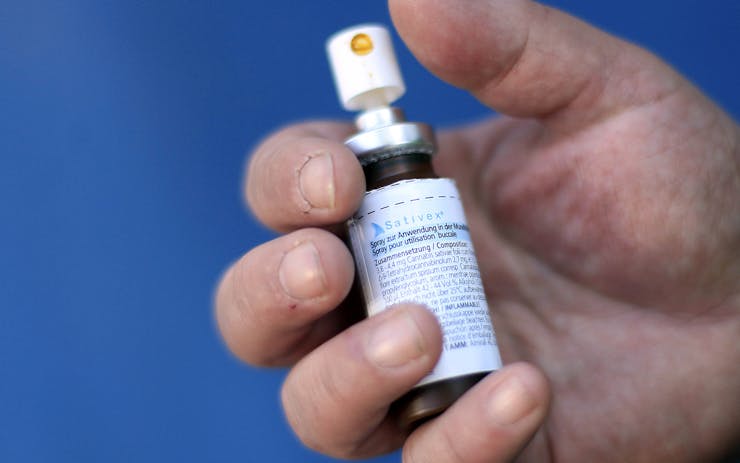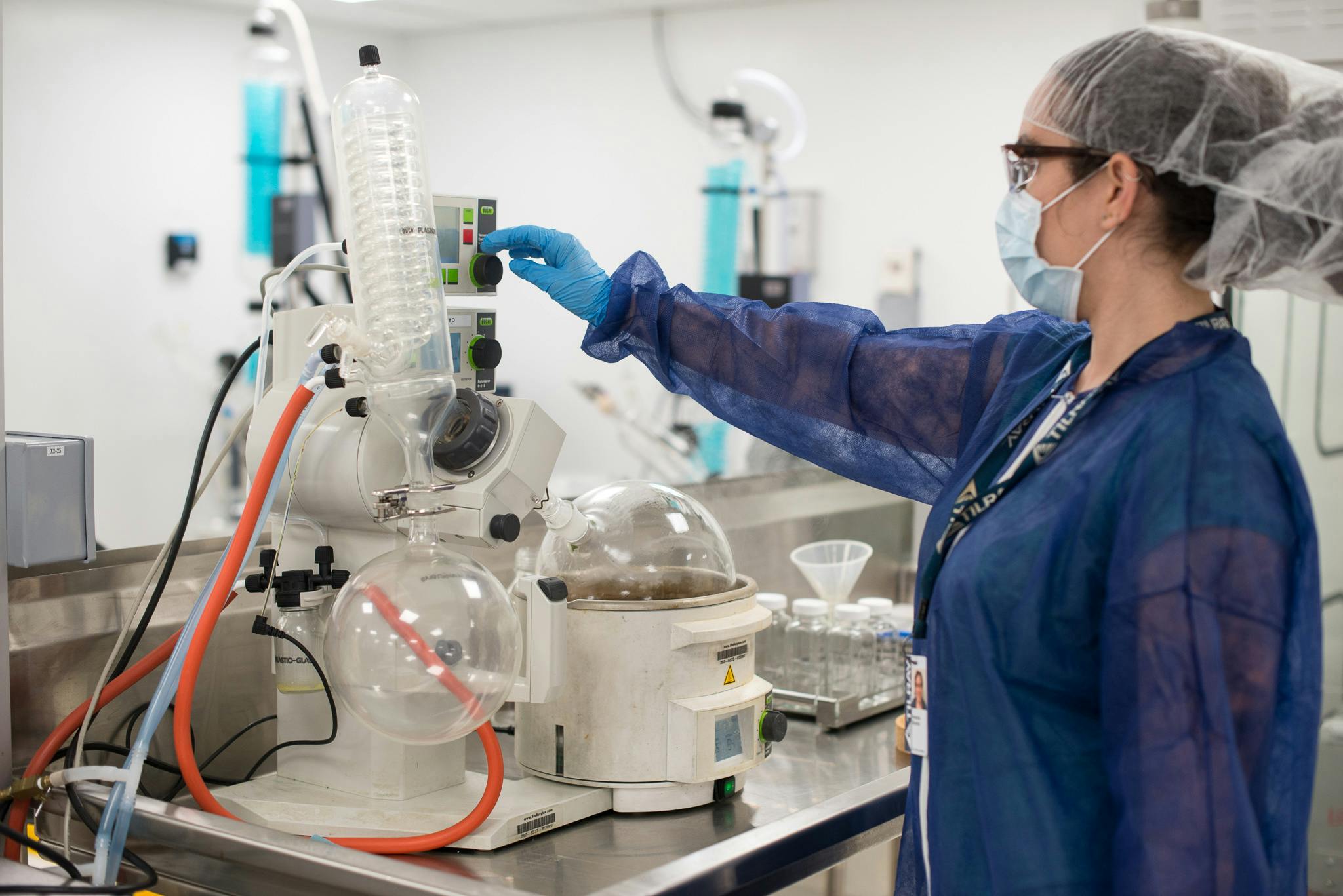For nearly four decades, marijuana has been classified as a Schedule I drug, more tightly regulated than opium or cocaine. So it marked a milestone this week when the US Food and Drug Administration granted approval to the first-ever pharmaceutical derived from the cannabis plant.
Epidiolex, developed by UK-based drugmaker GW Pharmaceuticals, is a purified form of CBD meant to treat certain forms of epilepsy. While the FDA has approved other, synthesized cannabinoids—such as dronabinol, a synthetic version of THC—never before have government regulators acknowledged the medical benefits inherent in the Cannabis sativa plant itself.
Needless to say, it’s a big moment for medical marijuana. CBD, which parents of epileptic children in some regions have risked criminal penalties to obtain, may soon be available nationwide.
“We believe that Epidiolex will be scheduled probably in the Schedule IV or Schedule V categories, which is similar to other antiseizure medicines.”
“It’s been a busy couple days,” said Stephen Schultz, vice president of investor relations for GW Pharmaceuticals and its US subsidiary, Greenwich Biosciences. “It’s an exciting and historic approval.”
The FDA announcement has fueled all sorts of speculation, from questions of rescheduling to speculation over the price of Epidiolex. It also raises the question of what other drugs GW Pharma has in the pipeline.
Leafly recently spoke with Schultz about the significance of the FDA decision, when Epidiolex might become available to patients, and what’s coming next from GW. Below is an edited transcript of the conversation.
Leafly: This week brought big news that the FDA had granted approval to Epidiolex, a plant-derived CBD extract that’s shown rather remarkable success treating childhood epilepsy. Can you start by explaining a bit about Epidiolex’s effectiveness?
Schultz: GW Pharmaceuticals and our US subsidiary, Greenwich Biosciences, ran a full clinical development program for Epidiolex, which is purified CBD. That program yielded three placebo-controlled, robust clinical studies, all three of which have been published in top-tier journals—two in the New England Journal of Medicine and one in The Lancet.
The data is extensive, and covers both Dravet syndrome and Lennox-Gastaut syndrome, forms of epilepsy in patients that are treatment resistant, which is the vast majority of those populations. Those trials yielded in-depth information about both the safety and the efficacy of our product.
We found that there were statistically significant reductions in the primary endpoints—seizure reductions for the different types of seizure conditions. There were side effects associated with the medicine as well. Those are well documented both in the product label that was issued by the FDA and in the New England Journal of Medicine and The Lancet articles.
These patients are generally on multiple medicines. In our clinical trials, on average these patients had tried and failed ten medicines and were on an average of three before introducing our product into the mix.
Now that the FDA has approved Epidiolex, what happens next? Do we have any sense yet of when the drug might actually become available to patients?
This first step was approval, and obviously we have that behind us. The next step is for the DEA to reschedule the product, which we expect to occur within 90 days of yesterday’s approval. The rescheduling will be the result of an analysis that the FDA does, and then hands off to the DEA. The DEA then utilizes abuse-liability information that we included in our new drug information, as well as whatever data they choose to include in their analysis. And again, we expect that process to conclude within 90 days.
The drug must be rescheduled—the definition of [Epidiolex] as it was approved demands that it be moved out of Schedule I. The abuse analysis study was reflected on in the April 19 FDA advisory committee meeting, which was a public meeting. That analysis suggests a very low abuse potential for this purified CBD, so we would expect that the rescheduling would end up on the less-restrictive end of the scheduling spectrum.
You’re saying you’re expecting a bigger shift than just moving CBD to Schedule II?
The scheduling is Schedule I through Schedule V, and I think we believe that Epidiolex will be scheduled probably in the Schedule IV or Schedule V categories, which is similar to other antiseizure medicines, benzodiazepines, and products of that nature.
I recognize the FDA trials had to do with epilepsy, but obviously anecdotal evidence suggests CBD has medical potential to do a lot more than that. Could the approval of Epidiolex mean wider availability of CBD for things like chronic pain, anxiety, and other conditions?
It’s a good question. The FDA requires, however, that companies evaluate their medicines in specific patient populations. They do that for good reason, because different patient populations and different therapeutic targets may respond differently to the same medicine. For an approved medicine such as Epidiolex to be distinguished by the scientific evidence, it has to be distinguished through the clinical data that we’ve developed.
While the prescribing of a medicine is between the patients and their physicians, Greenwich Biosciences will not promote the drug outside of the Dravet and Lennox-Gastaut populations. That would be inappropriate, and again, the decision to prescribe any medicine is between the physician and their patients.
One of the things that’s most notable about this FDA approval is it’s the first time regulators have OK’d a medicine actually derived from the cannabis plant instead of synthesized in a lab. Is that significant as far as GW Pharma is concerned, and if so, why does that matter?
For us, it’s important because what it does is it gives us a sense of validation that the path that we’re on and the method by which we create our medicines—which is through the use of plant-derived cannabinoids—is a path that works. It’s a path that the FDA clearly looks at favorably if done correctly, and it’s a path that can yield an FDA approval.
That gives us—and it may give others that plan to work in this area as well—confidence to move forward with a number of other medicines and to continue to expand the work that we’re doing with Epidiolex in the epilepsy area, as well.
As you probably know, the approval of Epidiolex has caused a bit of a scare among some in the marijuana community, specifically those who stress the importance of “whole plant” extracts containing other potentially beneficial cannabinoids. Some worry this could actually be a setback for folks who are more whole-plant focused. Do you have any thoughts on that?
Not really, no. Our thought is that other CBD options are really not for us to comment on.
“We expect to bring Sativex into the United States, put it into clinical development, and try to get it in front of the FDA as quickly as possible.”
We developed our medicine in the manner that we did because we believe that patients and physicians desire a CBD medicine to treat these difficult seizure conditions, because they desire a medicine that has the hallmarks of a modern medicine. It doesn’t vary at all—every time they take it—which is a problem with many of those other products. It offers the scientific evidence that we talked about earlier and the instruction of articles like the New England Journal of Medicine article and The Lancet article, to enable physicians to understand the medicine in more detail and how to utilize it, how to bring it into their clinics. And it also offers the potential for reimbursement through the patient’s insurance program.
We believe there is a significant demand for a product that has those characteristics, and that’s why we take this approach.
Another concern I’ve seen has to do with the cost of treatment. You mentioned that Epidiolex might be covered under insurance, but already the New York Times has reported that Epidiolex could cost somewhere between $2,500 and $5,000 a month. Is that accurate, and if so, what options are there to make this more affordable to people who could benefit from it?
We have not set a price for the medicine yet, and we won’t do so until we have the rescheduling by the DEA. So it’s difficult for me to comment on other price speculation, but I think that the New York Times estimates are probably higher than we’re modeling at the moment.
With that said, we want to make sure that our medicine, once it’s available, can be utilized by patients that need it and patients who desire to have the pharmaceutical CBD product. There are various strategies for us to enable that, but I’d prefer not to go into a lot of detail because some of them are still in development. Suffice it to say our company’s objective is to ensure that patients with Dravets syndrome and Lennox-Gastaut syndrome are able to access the medicine if they need it.
Sometimes, when a state legalizes cannabis, consumers who are used to pre-legalization prices often end up staying in the illicit market in order to have access to a cheaper product—at least until prices fall. Is GW Pharmaceuticals concerned about competing with high-CBD cannabis oils already available in medical marijuana dispensaries and adult-use markets?
In our discussions with patients and physicians, we see significant demand for the FDA-approved pharmaceutical medicine. It’s one of the reasons we developed the medicine, and we still stand quite confident that it is a product that will be selected by physicians and patients for the treatment of their seizures in the Dravets and Lennox-Gastaut populations.
With that said, the decision is between the patients and the physicians. Whatever they choose as the best route for their particular case is a decision for them and not us.
What other cannabis-derived drugs does GW Pharma have in development?
We intend to continue evaluating Epidiolex in treatment-resistant epilepsies. In fact we have a trial ongoing right now for a condition called Tuberous-Sclerosis Complex, or TSC, which features seizures as a primary comorbidity of that condition. We expect data for that in 2019. We will probably continue to look to expand the Epidiolex label by initiating additional clinical trials for other forms of treatment-resistant epilepsy as well.
Beyond Epidiolex, a very exciting product on our US horizon is Sativex, which is approved for use in a number of countries in Europe for the treatment of spasticity, which is due to multiple sclerosis. It’s a very painful condition. We expect to bring it into the United States, put it into clinical development, and try to get it in front of the FDA as quickly as possible.
Beyond Sativex, we are interested in expanding on the clinical evaluation of several products that have gone through early proof-of-concept studies. Those products include therapeutic areas of schizophrenia; of neuroblastoma, which is a very aggressive form of brain cancer; and also we expect to initiate clinical studies later this year in autism spectrum disorders and specifically one disorder, called Rett syndrome, which is a very difficult autism spectrum disorder that affects mainly young girls.
Basically, that is how we develop our science: We look at the cannabinoids, either individually or in combination—Sativex is a combination of CBD and THC—and we evaluate those cannabinoids against different therapeutic targets in preclinical and then ultimately in clinical evaluation with the goal of bringing them in front of regulators and having them approved for use.






